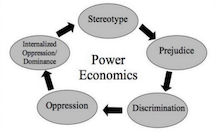
BLOG POSTS
Suffering ≠ Resilience
Last week, I read yet another story of a person who had been through tough times who has now soared above what others believed they could become. The story purported to be one of “resilience,” however stories like this one keep us stuck where we are without pointing us forward.
Last week, I read yet another story of a person who had been through tough times who has now soared above what others believed they could become. The article purported to be one of “resilience,” however stories like this one can keep us stuck where we are without helping us move forward.
Stories like this equate suffering with resilience. Suffering is part of the human condition. Surviving tough times is not necessarily a sign of resilience. Many, many people survive difficult times. How well they do as they move through their lives is more related to their supports (known and unknown) than on their particular hardships. Resilience is about thriving, not surviving. Calling someone resilient after hearing that they’ve suffered sounds positive, but lends itself to a sense of complacency. “They are already resilient, they won’t need other supports.”
This story also seems to be saying, “You see, if this person can do it, all of y’all should be able to do it. And if you cannot, or do not, that is your own fault.” This is a fallacy.
It maintains that the responsibility for “making it” lies solely, directly, on the individual, when in truth, there are many systemic barriers to achieving certain goals in the US, including but not limited to sexism, ableism and racism. When individuals achieve, they do so with the help of many people and systems, known and unknown.
Meanwhile, under the guise of holding up this person as a shining light, the article goes on in great detail about the “failings” of their parents (drugs, jail, child protection involvement). The people in stories like this one are most often people of color, however there is room, too, for very poor white people. This part of the story maintains the idea that some families (poor and/or people of color) are “bad” and unable to sufficiently nurture and raise their children. Being silent on the forces of those “isms” I mentioned earlier implies that they do not exist.
Next the story shows the child in a “family” picture with their new family, all white. In the family picture, the African American individual has their hair completely straightened and combed to match the other family members. A nice, white savior family. Who turned this child’s life around. It says nothing of this family’s history or even their hard work raising children. It implies by its lack of explanation, that they were able to do it because they were “good” people. In truth, that family had to work hard to support this child (and others), and that family had other supports – foster youth workers, teachers, counselors, principals, other family members, coaches, friends, co-workers – and others I haven’t named because the article didn’t mention any of them.
Results of a search for “foster family”
Let me be clear – I am a fan and supporter of foster care families. I know how hard they work and love their children. I do not believe that the family in the story are walking around saying, “We’re a good, white savior family, and we should be praised.” I really don’t. However I do believe that articles like these perpetuate that story line. Without the people in the story knowing. Maybe even without the author of the story knowing! This story line is one that is so deeply embedded in American culture it goes unacknowledged.
Stories like this one keep us separate and judgmental, ignores external forces and internal work. And they do nothing to point us in the right direction to encourage actual resilience, which is about believing we have the resources (or can get them) to meet challenges and overcome vulnerabilities. We can foster resilience, in families, friendships and schools. I believe a more powerful, change provoking story would tell us about that journey.




